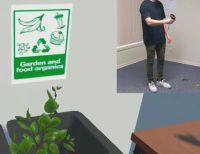15 March 2024
 Mock ‘Ninja knife throwing’, ‘Gibberish’, or the fast and furious ‘Zap’ – they’re all favourite theatre games designed to break ice and boost confidence. But add speech therapy to theatre sports and you get a brand-new experience that’s hoping to deliver positive changes for people with a stutter.
Mock ‘Ninja knife throwing’, ‘Gibberish’, or the fast and furious ‘Zap’ – they’re all favourite theatre games designed to break ice and boost confidence. But add speech therapy to theatre sports and you get a brand-new experience that’s hoping to deliver positive changes for people with a stutter.
In a new University of South Australia study, researchers are trialling group improvisation (‘improv’) to help improve communicative confidence and reduce anxiety among teens and adults who stutter.
Improv is a form of theatre sport, where performers spontaneously create scenes, characters, and dialogue without a script or predetermined plot.
Partnering with Swift Speech, Stuttering & Voice, the 9-week group improv program Unscripted Confidence, is designed to help participants positively engage in a range of activities and social situations to help build their confidence and communication abilities in a risk-free supportive environment.
The team is now offering a free ‘Come and Try’ session on Wednesday 20 March so that people can get a taste of the new program and how it operates, ahead of a new round of adult and teen sessions in April*. People who want to participate in the study will gain the benefits of the therapy for free.
UniSA Bachelor of Speech Pathology research honours student Damien Aston says the study will take a holistic approach to therapy, ensuring people feel comfortable, safe and supported.
“In Australia, one in 100 people have a stutter; and while it’s a relatively common speech difference, it can significantly affect a person’s confidence, social connections and anxiety levels,” Aston says.
“Improv provides an opportunity for a person with a stutter to have fun speaking with others, to learn to focus on the communicative aspects of speaking – such as eye contact and body language – rather than how they are speaking, and helps them learn to be ok with failure.
“While it may seem counterintuitive for someone with a stutter to participate in ‘on the spot’ games, spontaneous performances can be a powerful tool for building confidence and overcoming anxiety and stuttering.
“The sessions encourage people to engage and connect with others in a supportive, non-judgemental space where they learn to look beyond words – making sense doesn’t matter, it’s the risk that’s valuable and the fact that people are communicating and having fun at the same time.”
Senior Speech Pathologist and UniSA researcher Dr Michelle Swift has been working with people who stutter for more than 16 years. She says the improv study hopes to develop long-term solutions and supports for people who stutter.
“Currently, about 30% to 60% of clients who stutter can relapse after traditional speech treatment,” Dr Swift says.
“We know that group therapy can reduce social anxiety and the severity of stuttering, and we also know that drama therapy can promote self-esteem and reduce anxiety.
“By combining these, we hope to provide long-term positive outcomes for the many people who struggle with anxiety and stuttering.”
To find out more about the study, or to register as a participant, please visit: https://swiftspeech.clinic/pages/research
Notes to editors:
- Adult improv groups will start from Wednesday 3 April and the Teen groups from Wednesday 24 April. Both groups will be 60 minutes long for nine weeks. Research participants attend the groups for free. For non-research participants the cost is $50/session (or $450 total for the nine weeks).
- Teen participants can range in ages from 14 years of age to 17 years of age; adult participants should be 18 years of age and above.
………………………………………………………………………………………………………………………….
Media contact: Annabel Mansfield M: +61 479 182 489 E: [email protected]
Researchers: Damien Aston: E: [email protected]
Dr Michelle Swift E: [email protected]
















